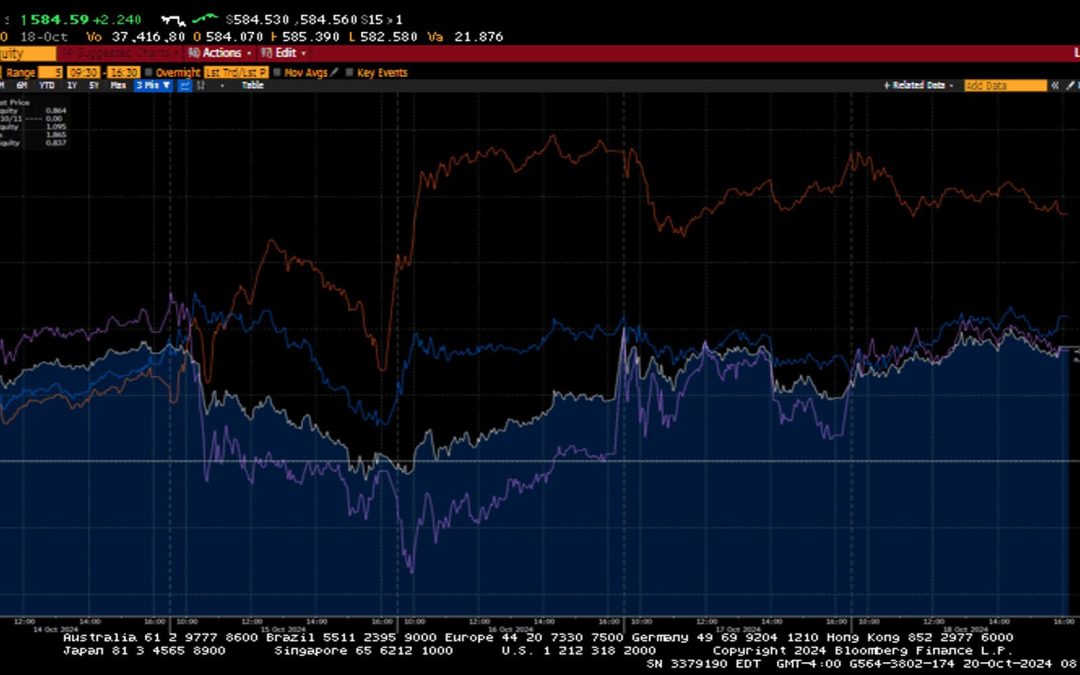-Darren Leavitt, CFA
The S&P 500 advanced for the sixth consecutive week, closing at a new record high. This week, a broadening out of the market’s rally was evident, with small caps and the equally weighted S&P 500 index outperforming. Markets also appear to be embracing parts of the market that were favored when Trump won the presidential election in 2016. The so-called Trump trade includes exposure to the financials, the US Dollar, Small Caps, and, this time around, crypto assets. Interestingly, national polling shows the presidential race as a dead heat within the margins of error; however, in the betting venues, where over two billion is wagered on the presidential election, Trump is the clear favorite. With just over two weeks before the election, markets feel a bit extended. Still, better-than-expected third-quarter earnings, along with robust economic data, have prompted investors off the sidelines for fears of missing out on further gains.

On the earnings front, I would highlight continued strength in the financials. Morgan Stanley, Goldman Sachs, and Blackstone were notable outperformers. Netflix posted solid results, and so did United Airlines. The Semiconductor sector posted mixed results this week as the Biden Administration announced further measures to curb the sales of advanced AI chip technology to specific countries. The news came just before the errant early release of Dutch semiconductor equipment maker ASML’s quarterly results, where the company missed on earnings, revenues, and bookings while slashing its full-year 2025 guidance. The news sent shares lower by 17% while its peers sold off in sympathy. Later in the week, the Semis caught a bid off of the better-than-anticipated results from Taiwan Semiconductor. The healthcare sector struggled this week due to disappointing results from United Health and Elevance. Apple advanced on the news that sales of the iPhone 16 accelerated in China.
The S&P 500 added 0.9%, the Dow rose by 1%, the NASDAQ gained 0.8%, and the Russell 2000 jumped 1.9%. The Treasury market ended the week flat, with the 2-year yield increasing by one basis point to 3.95%, while the 10-year yield closed unchanged at 4.07%.

Oil prices tumbled 8.4% on the week as several reports suggested that Israel is not currently targeting Iran’s energy infrastructure. Israel also announced that the IDF had killed the leader of Hamas, Yahya Sinwar. The news prompted calls for renewed cease-fire discussions. Oil and other commodities were also weak due to the lackluster stimulus announcement made by China’s Minister of Finance, which offered very little regarding how the Chinese aim is to boost domestic consumption. WTI, which lost $6.30 to close at $69.16, posted the largest weekly loss this year. Copper prices fell by 2.4% to $4.38 per Lb. Gold prices topped $2700 for the first time and closed higher by 2% at $2730.20 an Oz. Bitcoin rallied 8% or $5,500 to close the week at $68,400. The US Dollar index advanced by 0.6% to close at 103.49.

The economic calendar was relatively quiet this week. Retail sales came in better than expected and showed a resilient consumer. The headline number increased by 0.4% versus the consensus estimate of 0.2%, while the Ex-Autos number increased by 0.5% versus the forecast of 0.1%. Initial claims fell by 19k to 241k, while Continuing Claims increased by 9k to 1867k. Finally, Housing Starts were a tad light of expectations at 1354k, while Building Permits fell short of expectations at 1428k.

